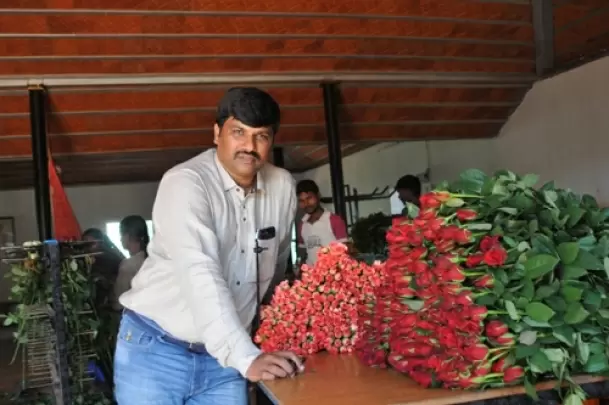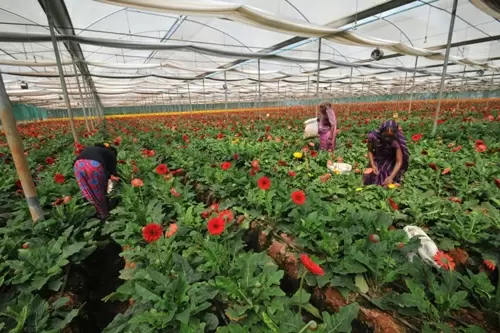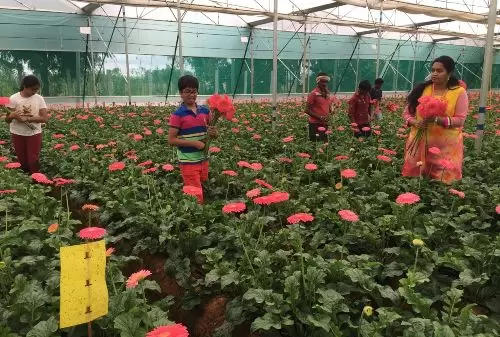At 16 he worked in a farm for Rs 1,000 salary, now he owns a Rs 70 crore turnover floriculture business

09-December-2016
Vol 7 | Issue 50
For 40-year-old Bollapally Srikanth, life is in full bloom. Srikanth, who found a job at a flower farm for a salary of Rs. 1,000 per month when he was just 16, is an established player today in the Indian floriculture sector with an annual turnover of Rs 70 crore in the last financial year.
A Class 10 dropout, he came to work at an acquaintance’s flower farm in Nelamangala in the outskirts of Bengaluru, from Bodhan, his hometown in Nizamabad District of Telangana.
 |
|
Bollapally Srikanth started a flower shop at the age of 18 with an investment of Rs 20,000 from his savings and some borrowed money from his family and friends (Photos: H K Rajashekar)
|
His family was dependent on agriculture and deeply in debt when he decided to quit his studies and take up a job.
"I lived with my parents and a younger sister in Bodhan. The income from agriculture was not enough to sustain the family of four. Though I wanted to study further, I decided to earn and support my family," recalls Srikanth.

At the Nelamangala farm, where he lived and worked for about 18 to 20 hours daily for two years, he learnt the A to Z of floriculture business - from cultivation, harvesting, marketing and even about exports.
When he was barely 18, Srikanth decided to start his own flower retail business by investing Rs. 20,000 with his second year’s salary of Rs 12,000 and some borrowed money from family and friends.
Initially, his family was a bit reluctant to support him and his father wanted him back at their hometown to help him in agriculture. But Srikanth was determined to listen to his inner voice and went ahead with his plans.
He started a flower shop, Om Sri Sai Flowers, in a 200 sq ft space at his residence in Wilson Garden, Bengaluru. His experience in the farm and the contacts he had cultivated over the two years he worked there stood him in good stead in his new business.
.webp) |
|
Srikanth cultivates Rose, Gerbera, Carnation, and Gypsophila in greenhouses at his farm in Tubagere
|
He collected the flowers from growers and wholesale dealers, then packed and supplied them to customers all by himself. Day by day, his clientele list grew longer and he started supplying flowers at weddings, star hotels and other events.
"I knew a lot of growers and distributors. Though many were my father's age, they liked me and my work a lot. A few of them even gave flowers on credit," says Srikanth.
As business grew, he tied up with growers on a buy-back arrangement. In the very first year, he achieved a turnover of Rs 5 lakh and the following year his earnings doubled. By the time he was 25, the turnover had touched Rs 5 crore.
 |
|
Srikanth has provided employment to around 300 people including 80 workers who stay at his various farms
|
In 2005, he turned his attention to floriculture and bought 10 acres of land in Tubagere in Doddaballapura taluk, Bengaluru rural district, and named it Srikanth Farms. He named his floriculture venture Vensai Floritech.
Initially, he started cultivating in six acres. In 2009-10, he expanded to another 30 acres of land around the same place and bought 10 more acres in Coonoor in the Nilgiris District of Tamil Nadu.
Srikanth cultivates various flowers including Rose, Gerbera, Carnation, and Gypsophila in greenhouses and polyhouses in a 30 acre-area in Tubagere. In Coonoor, he grows liliums and carnations.
"Floriculture is not as easy as it seems. Unless you give your 100 per cent and do it seriously, you can't see good results. From planting to marketing, you should get involved full time," says Srikanth.
 |
|
Flowers from Srikanth's farm are even exported to Dubai
|
With flowers grown at his farms contributing just 10 per cent to his business, he sources flowers from Ooty, Kodaikanal and surrounding areas of Bengaluru to bridge the demand-supply gap. He also imports from Thailand, Australia, New Zealand and Holland to meet the shortfall.
His flowers are delivered to markets across the country and exported to Dubai as well.
To study the floriculture scene across the globe and learn the latest farming techniques – which he implements at his farms - Srikanth has visited more than 20 countries so far.
"My first foreign visit was to Europe when I was 22. I started visiting flower-growing hubs and auction centres in various countries and gained first-hand knowledge," he says.
 |
|
Raga Srivanthi, Srikanth's wife, has been his biggest support in his business (Photos: By special arrangement)
|
Srikanth harvests rain water at his farm. "We require four lakh litres of water per day. When the rainfall is good, we make use of the harvested rain water for almost seven to eight months," he shares.
With 300 people employed at his farms and office in Wilson Garden, Srikanth also provides accommodation and food to around 80 workers in his farms.
"I am happy that I have been able to provide employment to around 300 people. I have also been able to provide jobs for people from my home town," says Srikanth.
Srikanth got married in 2002 to Raga Srivanthi, who hails from Hyderabad. His wife has been his biggest support and strength in his success. She handles the office accounts and assists him in his business by communicating to customers and taking orders.
Their daughter Moksharee, who is in Class seven and son Harshavardhan, who is studying in Class six, are also passionate about farming and look forward to weekends and holidays to join their parents and help them in the farm.
 |
|
Srikanth's children love to work at the farm
|
"I knew only Telugu and Hindi when I came to Bengaluru. Regular interaction with growers and traders from different regions helped me learn another five to six languages including English. It has helped me a lot in my business," says Srikanth.
Summing up his life, Srikanth says his decision to move from his hometown and “the urge to do something different” had brought him success.
“The younger generation should dream big and bring about the much-needed change. Only when youngsters break the barriers and set themselves free, they can create something new and different for themselves. That’s what I have done," he concludes.
This Article is Part of the 'Amazing Entrepreneurs' Series
More Amazing Entrepreneurs
P C Mustafa, CEO, iD Fresh Food














